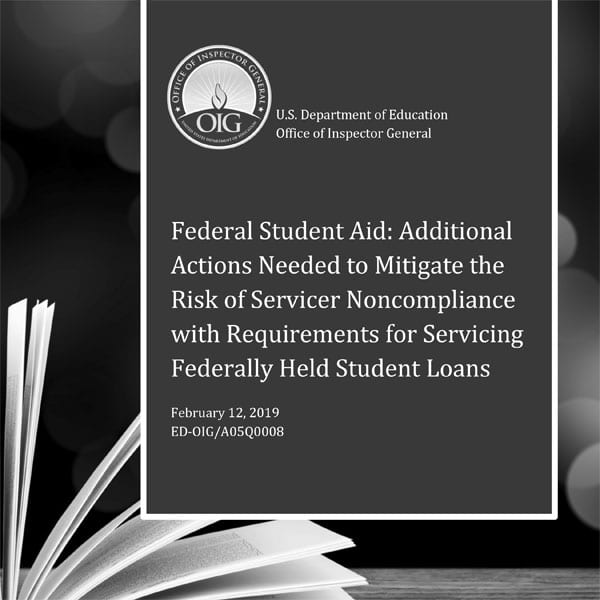
February 14, 2019; Forbes
Last year, an audit revealed that those participating in the student loan forgiveness program for those employed by nonprofits, among other specified jobs, were not being rewarded with the promised debt cancellation after ten years. Now, the latest audit from the Office of the Inspector General (OIG) of the US Department of Education has exposed failures to follow federal rules by the loan servicers who manage the student loans and collect the payments.
This latest audit studied records from 2015 through 2017. It showed that Federal Student Aid (FSA), which is the office of the US Department of Education that oversees the student loans, have rarely penalized loan servicers when errors by those companies have been discovered. This may have compromised the rights of the student loan borrowers.
Significant findings of the audit include:
Sign up for our free newsletters
Subscribe to NPQ's newsletters to have our top stories delivered directly to your inbox.
By signing up, you agree to our privacy policy and terms of use, and to receive messages from NPQ and our partners.
- Lack of accountability provisions to hold servicers accountable for noncompliance.
- Lack of performance metrics for servicer compliance.
- Failure to hold servicers accountable could have led to servicers being paid more than they should have been.
- Failure by FSA employees to follow policy when evaluating the quality of servicer representatives’ interactions with borrowers.
Errors were also discovered in the calculations for income-driven payment plans. FSA produced 210 reports regarding the repayment amounts: 152 reports on reviews conducted by the process monitoring team, 25 from Financial Institution Oversight Service, and 33 reports on reviews conducted by the servicer liaison team.
- Twenty-two of the 25 Financial Institution Oversight Service reviews covered the calculation of income-driven repayment amounts. Five of those 22 reviews disclosed instances of servicers not correctly calculating borrowers’ repayment amounts.
- Ten of the 152 process monitoring team reviews covered the calculation of income-driven repayment amounts. Two of those 10 disclosed instances of servicers not correctly calculating borrowers’ repayment amounts.
- Nine of the 33 servicer liaison team reviews covered the calculation of income driven repayment amounts. Six of the nine reviews disclosed instances of servicers not correctly calculating borrowers’ repayment amounts.
The executive director of the Student Loan Borrower Protection Center, Seth Frotman, stated, “This damning new audit is just the latest in a series of lawsuits and reports by law enforcement officials and government watchdogs showing the Department of Education is asleep at the switch while borrowers get hurt.” Frotman was the former student loan ombudsman at the Consumer Financial Protection Bureau.
Students can educate themselves about loan payment options. There’s the aforementioned loan forgiveness program for nonprofit employees, at least for the time being. There’s also a new super-specific loan forgiveness arrangement for professionals working in opioid addiction programs, created by the National Health Service Corps (NHSC), a division of the US Department of Health and Human Services. For three years of full-time work at an approved substance site, there is $75,000 for loan repayment. (There’s also a smaller award for part-time professionals.) Be aware of all the payment options available, from income-driven repayment plans to forbearances if suddenly unemployed. Compare loan servicers, check the loan payments with calculators, and get a second opinion on the information from those servicers. And, always follow up; complain as soon as a mistake is discovered.
US Senator Lamar Alexander (R-TN), the chairman of the Senate Health, Education, Labor and Pensions Committee, has recently proposed a bill that would automatically deduct federal student loan payments from paychecks, similar to Social Security. This is only a proposal at this moment in time, but considering the errors and continuing complaints regarding the federal loan servicers, there is hardly any confidence that this would be without more mistakes, errors, and disregard for the rights of the student loan borrowers.—Marian Conway













